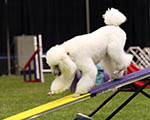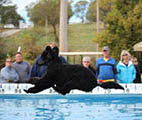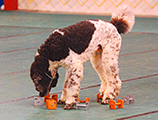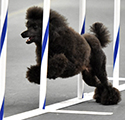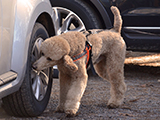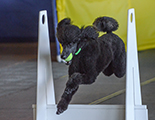Fact Sheet
Patellar Luxation
Toy, Miniature and Standard.
The kneecap luxates, or pops out of place, either in a medial or lateral position. There are 4 grades of luxation, besides a dog that is “normal.” The higher the grade, the greater the tendency to luxation and deformity.
Signs vary dramatically with the degree of luxation. In grades 1 and 2, lameness is evident only when the patella is in the luxated position. The leg is carried with the stifle joint flexed but may be touched to the ground every third or fourth step at fast gaits. Grade 3 and 4 animals exhibit a crouching, bowlegged stance (genu varum) with the feet turned inward and with most of the weight transferred to the front legs.
Unknown, although familial tendency is suspected. Patellar luxation may also be caused by a traumatic accident or abnormal structure.
The dog is examined awake (chemical restraint is not recommended) by palpation of the suspicious joint structure.
Varies. Puppies as young as 8 weeks should be checked by a vet prior to being placed.
The kneecap should be returned to a normal position. Surgery may be necessary in severe or chronic cases.
Every dog being used in a breeding program should be x-rayed or examined for luxation prior to being bred. After one year old, the report should be sent to the Orthopedic Foundation for Animals for certification. Only dogs that are normal should be considered for breeding. Dogs that produce offspring with patellar luxation should be considered carriers. Great care should be taken to avoid breeding carrier to carrier.
The information contained in these documents is current at the time of this writing and is accurate to the best of VIP’s knowledge.
This information has been provided to you at no charge. You are free to use it provided it is used in its entirety with no changes or alterations and that the copyright remains intact. If you have found this information to be helpful, please consider making a tax-deductible donation to:
Versatility in Poodles
4061 Highlands Rd
Franklin, NC 28734
To make a donation via PayPal, please click the Donate Button:
![]()
The contents of the www.vipoodle.org website, such as text, graphics, images, and other material contained on this site (“Content”) are for informational purposes only. The Content is not intended to be a substitute for professional veterinarian advice, diagnosis, or treatment. Always seek the advice of your veterinarian with any questions you may have regarding the medical condition of your pet. Never disregard professional advice or delay in seeking it because of something you have read on this website!
If you think your pet has a medical emergency, call or visit your veterinarian or your local veterinary emergency hospital immediately. Versatility in Poodles and www.vipoodle.org do not recommend or endorse any specific veterinarians, products, procedures, opinions, or other information that may be mentioned on this website. Reliance on any information appearing on this website is entirely at your own risk.



